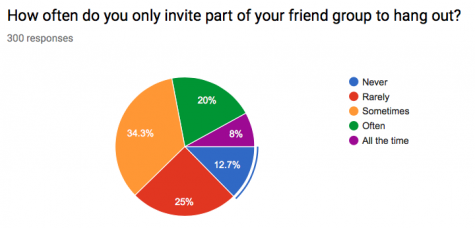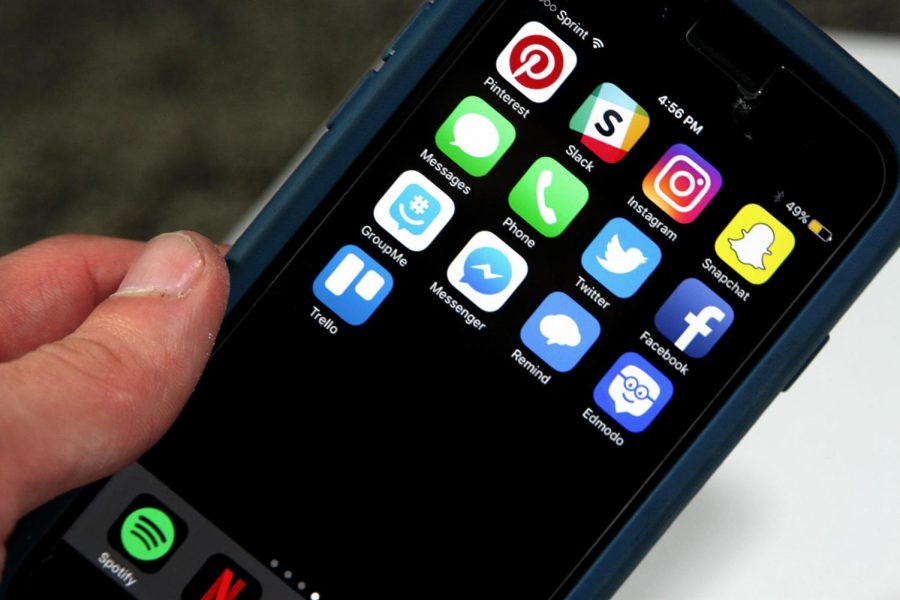FOMO
Students often feel isolated when they see their peers together without them.
October 31, 2017
On any Friday night, there are students sitting at home after the football game because their friends said they did not have anything planned. They scroll through their Instagram feed, and come across a picture of their friends at a party without them.
A survey by The Express found 73.7 percent of students spend more than an hour a day on social media. With students’ social media feeds littered with picture after picture of their friends at parties, concerts and other activities, senior Zach Taylor said outlets such as Instagram and Snapchat have essentially become places for people to post about all the great things they do.
“That’s kind of like all social media is,” Taylor said. “It’s just bragging about what you’re doing. Even though it doesn’t seem that way and it’s just the thing that people do now, when you get to the bottom of it that’s what it is.”
School psychologist Monica Symes echoed Taylor’s thoughts that social media often only focuses on the positives in someone’s life.
“We only post our best selves on social media and so it creates this falsity, almost, of how people are living,” Symes said.
While this false perception of someone on social media may not seem like a big issue, Symes said it can have adverse effects. These effects are known as the fear of missing out, or FOMO.
“Let’s say that I’m a teenager and I’m scrolling through social media,” Symes said. “I might be struggling with depression. I might be struggling with an esteem issue or something more than that and I see that [false portrayal] over and over and over again and it continues to feed my brain that my life is just not as good.”
However, Symes said FOMO does not only affect those going through depression, it has the potential to upset anyone on social media. The survey supported this as 53.8 percent of respondents described their feelings when missing out as “poor” or “awful.”
That’s kind of like all social media is. It’s just bragging about what you’re doing.
— Zach Taylor
“All of us have esteem,” Symes said. “Esteem can be high and esteem can be low and it can vary upon the day. I know, as an adult, as I’m scrolling through Facebook and looking at what my friends are doing I’m kind of like, ‘Man my life is not as great as this person’s.’”
Taylor, who is involved in Student Government, National Honor Society, Science National Honor Society and is a Peep, agreed just about everyone has been affected by FOMO at some point. One of the things he believes causes it the most is when people see pictures or videos posted on social media of other students at parties.
“On Snapchat, whenever people go out to a party there’s [posts of] them all singing and dancing,” Taylor said. “People who weren’t invited to the party or don’t go to parties could definitely feel like they’re missing out. Even if they don’t know that person they could be like, ‘Oh I wish I was doing something like that.’”
FOMO can overwhelm students who have busy schedules or extracurricular activities like junior Caroline Diederich, who runs cross country and track.
“If I’m sitting at home on a Friday night because I have a race the next day, I see everyone’s going out and partying,” Diederich said. “Even if it’s people I don’t even know it’s just like, ‘OK [I] can’t do that so that sucks.’”

As a member of the Northwest Frolf Association, Ukulele Club and the baseball program, sophomore Jay Oakes said he has especially experienced FOMO with some of his close friends.
“I’m sitting at home and I tell my friends I’m doing nothing and I see on their [Snapchat] story that they’re hanging out and I didn’t get invited for some reason,” Oakes said. “It makes me wonder what I did [wrong.]”
Although she said she has not experienced FOMO yet this year, freshman and cheerleader Hannah Walden said she and some of her close friends were getting left out by some of their other friends in middle school. She was not sure why they were being excluded.
“It made those of us who weren’t invited kind of mad and feel like they didn’t like us,” Walden said. “We tried [to ask why,] but they didn’t really want to talk.”
Diederich said FOMO is almost unavoidable because social media makes it so accessible for students to see what they’re missing out on.
“It’s so easy to just post stuff and everyone just wants to post all the time,” Diederich said. “It’s posted everywhere what’s going on and it’s just kind of thrown in people’s faces.”
One of the ways Taylor said people try to avoid FOMO is by responding to someone asking if they want to hang out with a “maybe,” instead of a definitive “yes” or “no,” so they can wait and make sure they will not miss out on something better. The survey showed 34.3% of respondents said they would reply to this sort of message with a non-definitive answer.
“Everyone has a reserve friend they [hang out with] if nothing else is going on,” Taylor said. “I definitely feel like people do that a lot; it’s not a very nice thing to do and I think I’ve done it before too.”
Symes said there are much better ways to curb FOMO. One of her recommendations for students is to practice metacognition, which is being aware of what they are thinking.
“Continue to ask…the question, ‘Am I really missing out?’” Symes said. “‘What is happening in my own life?’ ‘If I feel like I’m missing out, why do I feel like I’m missing out?’ ‘What can I do to help myself with those emotions?’”
In addition, Symes said she believed it is important for students to limit their time on social media and maintain a strong sense of self.
“I feel like, as a teenager, it’s really important to know that regardless of what you see on social media you are valued,” Symes said. “You are important and you are more than likely loved.”










